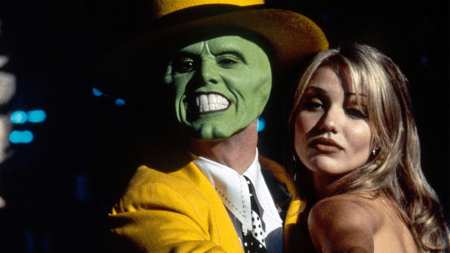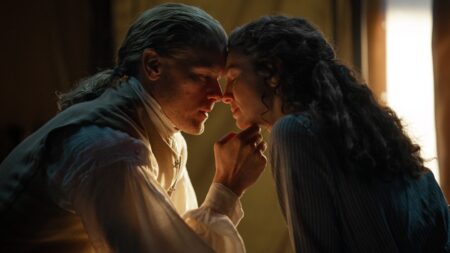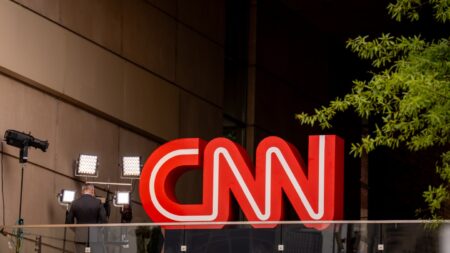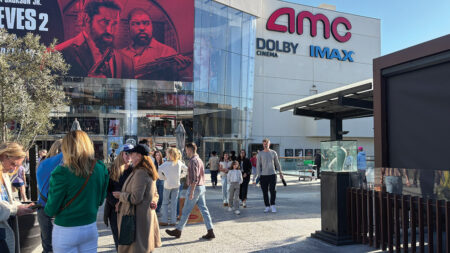[This story contains major spoilers from the season two premiere of Severance.]
In the first episode of Severance season two — released Friday — a recently promoted Mr. Milchick (Tramell Tillman) tells the severed versions of Adam Scott, Britt Lower, Zach Cherry and John Turturro’s protagonists that the group has become the “face of severance reform,” and a parade of apologies ensues. There’s a questionable cartoon presentation that assures everyone “Lumon is listening,” a weirdly sexual explanation for Ms. Cobel’s outie alter-ego and a big question mark about Helly’s (Britt Lower) lies.
Audiences have waited nearly three years since 2022’s breathless season one finale, but this return also raised even more questions: Why is Ms. Huang (Sarah Bock) a child? Where’s Ms. Cobel (Patricia Arquette) or Gemma (Dichen Lachman)? And what’s with that outie visitation suite? Plus, we’re still waiting on an explanation for that room of goats.
Creator Dan Erickson has all the answers. And he knows you’re tired of waiting. “I’m very conscious of not wanting to string people along,” he says.
But good things come to those who wait. This is Apple TV’s crown jewel, the belle of the TV ball that surfed a pandemic and several Hollywood strikes before finally landing a perfect 10 upon its return — already released to critics, the show scores 95 percent on Rotten Tomatoes.
Erickson wrote the Severance pilot in 2012 while working one of those jobs that might make the severance procedure sound appealing. In 2016, the script became the first TV show to earn a spot on the Bloodlist, where it found its way to Ben Stiller‘s Red Hour Productions.
The sale was Erickson’s first big break: Severance was his first time on a TV set. But make no mistake, he’s a master of his craft, and an expert world builder. “It’s always about stacking the mysteries on top of each other,” he says. It will all fit together in the end — even those goats!
Below, Erickson chats with The Hollywood Reporter about season two production, Lumon’s real-world reflections and all the big mysteries he can’t wait to solve.
***
Severance season one finished in April 2022. How long after that did you start work on season two?
We had been working on it for a while before [season one] came out, but it was more in an unofficial capacity. We were working on it in the hopes that it would be well-responded to and that we would get a second season. By the time it came out, we had started crafting [season two], but we hadn’t started writing scripts.
There’s this push and pull in following up a finale like the one at the end of last season: How many unanswered questions do you answer in season two, and how many new ones do you ask?
To me, it’s always about stacking the mysteries on top of each other. Think of a pyramid where with each season, you’re answering some things but that opens the door to a larger mystery that was underneath. I’m very conscious of not wanting to string people along or make them feel like there are no answers to be had, because that’s not fun. But at the same time, you can over-explain something and take the wonder out of it. I think that the key to that is that every answer opens a new door, and there are new wonders to explore.
As a creator, how far in advance do you know the answers?
I know the big answers. The really big stuff I’ve known from the beginning. There are deviations along the way in terms of how you get there. I’ve been lucky enough to talk to a lot of other showrunners, people who have done this before, and the common thread with those people is that it’s a tightrope. You can over-plan, and if you over-plan, your show can end up losing some of the spontaneity that makes it exciting, and you can feel like you’re just trying to tick boxes. If you under-plan, then you can end up painting yourself into a corner and not knowing how to get out. It’s a balance.
Have any of the answers changed from the stuff you’ve known since the beginning?
Some things. Not the biggest questions. The biggest mysteries have basically stayed the same. Details change, and specifics change, but mostly it’s the same. My current explanation for the goats is not wholly different, but slightly different, from what it originally was. You want to allow yourself that spontaneity to wiggle around a little bit within the plan you had previously established.
The first season filmed during COVID. Was the return for season two very different?
It wasn’t immediately that different because when we came back, productions were still being very cautious. We were still masked when we first came back, and those restrictions eased up over the course of the season, bit by bit. But it was so wonderful for me, having literally never been on a TV set prior to COVID. I felt like I got to experience it for the first time in a way, the camaraderie that you feel being able to go and talk to people, and even go out afterward and grab a drink with somebody and debrief. None of that stuff we could do in season one, so it was really wonderful for me.
Season one released during a particularly interesting era for Hollywood — we had the pandemic and then the strikes. Given your more unique background stepping into this world, how did all of that affect your approach to the job?
It affects it a lot. Those things make their way into the text of the show kind of organically. We didn’t really know when we were making season one what the return to work was going to feel like when the world ultimately did do start doing that, and what it was going to feel like to come back into the office having been doing remote work for so long. That experience informed the way we wrote season two. And then similarly — all these things are related — that experience of coming back to work changed the way people were talking about work and talking about how much of ourselves we owe to our employer and what we should expect back in return. It’s not a straight line, but I think that those kind of conversations led to things like the strikes, and people reassessing what work should feel like. So that made it into the story. Season three deals with a lot of the issues that we were experiencing in the real world while we were making season one.
Season three or season two?
Sorry, I misspoke. Season two dealt with a lot of the issues that experienced in real time for season one. But when we do think about continuing the show — if we are able to do that — we can’t help but think about things like the strikes, and what it was like to be on a strike line, and what it was like to be fighting for a better situation. It can’t help but affect our thinking as we continue to think about the show.
Lumon’s response to the group’s severance breach is so resonant with the same corporate jargon we hear in our universe all the time. Did you have any source material?
Yeah, we looked at the ways that whistleblowers had been treated in the past by companies or in some cases by governments. Anybody who exposes misdeeds of a powerful entity, there’s often a period where they fight you, and then there’s a period where they try to assimilate you, or co-opt your rebellion and make it part of the company story. Maybe to some extend that’s sincere sometimes, but it always struck me as a very specific kind of manipulation. At the end of the day, a company like Lumon wants to be the good guy, and there’s the sense that even this rebellion — they take credit for it. They say, “We’re grateful for it. We’re grateful for the ability to look at ourselves in the mirror.” For me, it’s difficult to take something like that at face value when we all know that what the company really wanted was for that behavior to never be exposed.
What went into deciding to start with the innies?
I had always wanted to play with the format a little more. I had been interested, going back as far as season one, in doing an all-innie episode. I thought it was an interesting way to play with the tension, especially starting with the innies because there’s so much we don’t know because the characters don’t know. We don’t know how much time has passed. We don’t know why they have all come back. There was just a lot of dramatic tension to be built.
Do you have a question (or an answer) that you are most excited for audiences to discover this season?
That’s a really good question. I do think that you’re going to get a sense of the reality that Gemma has been living in, and more of a sense of the experiences that she’s had. We’ve seen a very narrow sliver of it, and I think people are going to be excited to see what we’ve got there.
***
Severance is now streaming the first episode of season two, with new episodes releasing Fridays on Apple TV+.
Read the full article here
















